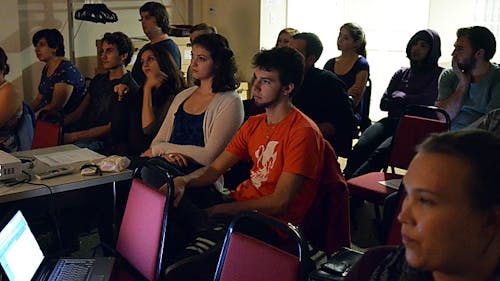Students share tactics on creating change

Through a live webcast, the Rutgers United Students Against Sweatshops (USAS) and the Rutgers Student Union heard tips on how to foster social change from their colleagues across the nation.
Attendees of last night’s “Take Back The Economy” event at 11 Stone St., watched the national USAS conference and discussed future tactics for raising awareness on issues.
Molly Magier, organizing director of the USAS University chapter, was one of a handful of student speakers at the Washington, D.C. conference. She spoke on the “Walk into Action” protest against tuition hikes last semester.
“I felt, I don’t want to help victims of the systems anymore. I wanted to change the system,” she said.
Magier, a School of Arts and Sciences sophomore, said the march on Voorhees mall — which attracted more than one hundred participants — and the 34-hour sit-in was successful.
“Because of our actions, the University experienced only a 1.8 percent tuition hike, which is the lowest in two decades,” she said.
Back in New Jersey, about two dozen participants discussed how to improve social actions and awareness last night, including how to combat the pay freeze on faculty salaries.
The organization’s latest attempt to reach out to University President Richard L. McCormick was last Wednesday, through a letter proposing the end of a three-year pay freeze.
It was halted by the Rutgers University Police Department, who blocked the entrance of Old Queens on the College Avenue campus, Magier said.
Students eventually received a response from McCormick, but it was not what the students and faculty were hoping for, she said.
McCormick came out of the building and listened to the students, but said he could not comment on the pay freeze because the University is in an arbitration process, Magier said.
“President McCormick had empty things to say,” she said. “I was hugely disappointed in his response.”
McCormick was not able to respond at press time, but University officials hope to resolve labor issues by talking with the unions and not through ad hoc protests, demonstrations or press releases, according to a statement.
“Rutgers and institutions across the nation continue to grapple with serious fiscal challenges,” according to the statement. “Rutgers’ goal has been to avoid layoffs during this period of extraordinary economic stress on our state and its citizens.”
The University enacted a freeze on pay raises three years ago on staff and faculty, Magier said.
“In order to share the burden, the union in good faith put off raises for one year,” she said. “But the University still hasn’t paid raises since then, which amount to $40 million.”
Joseph Cashin, a Rutgers Student Union member and one of the nine students delivering the letter, said USAS and Rutgers Student Union members believe the inaction hurts the University tremendously.
“The faculty is not getting what is owed to them and President McCormick just keeps repeating what he’s said, that the University fully intends to pay the raises,” Cashin said, a School of Arts and Sciences sophomore.
The University chapter of USAS became involved in protesting the pay freeze through working with other labor organizations, Magier said.
“[Our effort] was born out of the Rutgers Labor Association,” she said. “We’ve done a lot of work abroad, but we wanted to do something local.”
The American Association of University Professors-American Federation of Teachers University chapter funded an independent analysis of the University’s budget conducted by Howard Bunsis of Eastern Michigan University, said Patrick Nowlan, executive director of AAUP-AFT.
Magier said the analysis shows that the University had a budget surplus last year, but has not paid the faculty’s salary raises.
Data from the analysis found on the AAUP-AFT University chapter’s website claims the University has a $177 million surplus as of fiscal year 2010.
The University has not confirmed this amount.
“We are concerned that the administration is not fulfilling the primary needs of the University,” Nowlan said. “We need to have priorities and balance.”
Magier said while the two contracts are independent from one another, she thinks the University should honor the contract with the professors and other faculty.
“We don’t want to defund the athletic department,” she said. “We just want the money from the pay freeze paid back.”
Nowlan said the University has lost many valuable staff members because of the pay freeze, as there have been dozens of examples in which tenured professors have left.
“If professors get frustrated and say Harvard, Michigan, Berkley or North Carolina is recruiting them, and they have a pay freeze, they will leave,” he said.
Nowlan said, while professors experienced a pay freeze, the administration grew by 82 percent over the past five years, adding more expenditures.
“They have hired a lot of new deans and associate deans and the question is, ‘Are we too top heavy?’” he said.
Data from the University shows that only five executive, administrative and managerial positions were added between 2005 and 2010.
Cashin, who is also correspondent secretary of the Rutgers University Student Assembly (RUSA), said last night’s meeting was to educate students about the issues.
“We want to keep the momentum and build student power against the grievances we have against [administration],” he said.



